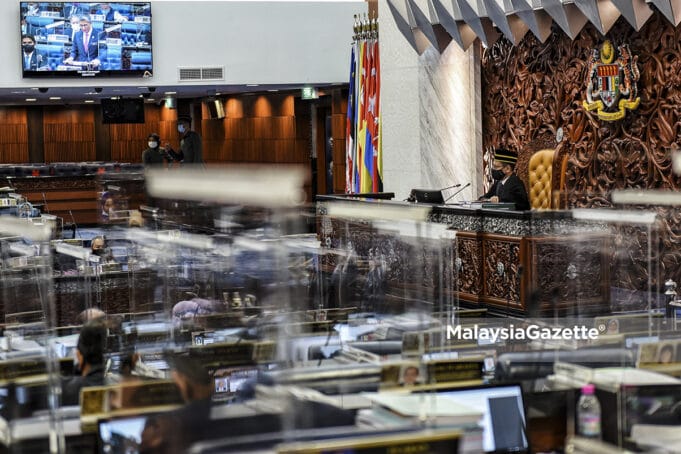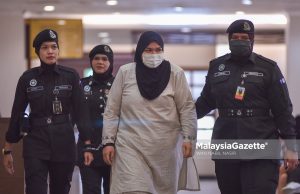According to media reports in English, UMNO President Datuk Seri Dr Ahmad Zahid Hamidi has urged the government to “reconvene” Parliament within two weeks. But the reports in Malay reported Zahid as urging the government to “convene” (memanggil) Parliament within two weeks. https://malaysiagazette.com/2021/06/21/parlimen-bersidang-dalam-masa-14-hari-bukan-cadangan-politik/
Do you convene (panggil) or reconvene (panggil semula) Parliament? Is there a difference?
Upon further reading of the constitution, parliamentary standing orders and parliamentary practices, there is in fact.
By the way, similar words used are “call” and “summon”.
Convene after dissolution
Parliament is convened after it is “dissolved”. This is the first sitting of Parliament after a general election. The word used in the Federal Constitution is “summon” [Article 55(1)]. When Parliament is convened after the general election, it is convened for the first session of the parliamentary term.
Parliament is currently in its fourteenth term – as such it is the 14th Parliament.
Convene after prorogation
Parliament is also convened after it is “prorogued”. Let me explain.
By parliamentary practice, a session is convened for every calendar year. In each session of Parliament – that is, in each calendar year – there are usually three meetings which are accordingly called the first meeting, second meeting and third meeting. A fourth meeting may be held in a calendar year and is called the special meeting.
The Bahasa Malaysia words for the above are “Penggal” – not that penggal – and “Mesyuarat”. The special meeting, if any in a calendar year, is therefore called “Mesyuarat Khas”. [see, for example, the Special Meeting of the Second Session of the Thirteenth Parliament – Mesyuarat Khas Penggal Kedua Parlimen Ketiga Belas]
After the last sitting in a session in a calendar year, Parliament is prorogued under Article 55(2) of the Federal Constitution. This is done before Parliament is convened – or summoned under Article 55(1) – for the first meeting of the next parliamentary session in the new calendar year. Example, the First Meeting of the Second Session of the Thirteenth Parliament – Mesyuarat Pertama Penggal Kedua Parlimen Ketiga Belas – which was held from March 10 – April 10, 2014.
Proroguing and summoning Parliament is by way of proclamation which is published in the Gazette. Example, the First Session of the Thirteenth Parliament which last sat on Dec 5, 2013 was prorogued by a proclamation dated Jan 8, 2014. The proclamation was published in the Gazette on Jan 25, 2014 [PU(A) 28/2014].
The first meeting of the second session was then convened or summoned by a proclamation dated Jan 18, 2014 and published on Jan 25, 2014 as well [PU(A) 29/2014].
In short, Parliament is prorogued after the last sitting in a session. This can be seen in the Hansard that records, among others, the parliamentary calendar (takwim) for each parliamentary term. https://parlimen.gov.my/hansard-dewan-rakyat.html?&uweb=dr&lang=bm&arkib=yes
Lawyers having access to legal databases may check out the proclamation to prorogue and summon Parliament on the relevant database.
Reconvene after adjournment
On the other hand, Parliament is reconvened after it is “adjourned”. An adjournment is a temporary break during a parliamentary session, such as at weekends, or during recesses, or between meetings.
Remember, there are usually three meetings in a parliamentary session. In between meetings, Parliament is adjourned. But after the last day of the last meeting of a parliamentary session, Parliament is prorogued. The prorogation usually comes later by way of proclamation before the next session is convened by way of proclamation as well.
Both proclamations, in practice, are dated and published on the same dates [see above].
When Parliament is adjourned it is reconvened only on the request of the government – that is, the prime minister as the Leader of the Dewan Rakyat. The Dewan Rakyat Standing Order 11(3) states as follow:
“If, during an adjournment of the House [Dewan Rakyat], it is represented to Tuan Yang di-Pertua [Speaker] by the Prime Minister that the public interest requires that the House should meet at an earlier date than that to which the House was adjourned, Tuan Yang di-Pertua shall give notice thereof forthwith and the House shall meet at the time stated in such notice. The business set down for that day shall be appointed by the Prime Minister and notice thereof shall be circulated not later than the time of meeting.
In the United Kingdom, the fact that only the government (read: the prime minister) can reconvene – or recall as the term is used – Parliament has been controversial. The former Speaker of the House of Commons, the colourful John Bercow, once suggested that an additional procedure, allowing members of Parliament (MPs) to request the recall of Parliament, be considered. To date, no such change has been made.https://www.instituteforgovernment.org.uk/explainers/recall-parliament
Convene or reconvene current Parliament
So, the current Parliament has to be convened – and not reconvened – for the First Meeting of the Fourth Session. Based on the original parliamentary calendar for this year (2021), it was to be on March 8 before the date was removed as the date was no longer valid with the enforcement of the Emergency (Essential Powers) Ordinance 2021.
As such, a proclamation to summon the First Meeting of the Fourth Session of the Fourteenth Parliament will have to be made and published in the Gazette. This must be preceded by a proclamation to prorogue the Third Session which ended on Dec 17, 2020.
There are formalities to convene or reconvene Parliament. As the above shows, there is a difference between the two.
To each its own formalities.

















